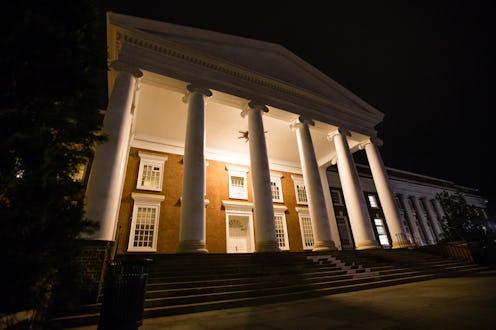The country is in uproar about the misreporting of an alleged gang-rape at the University of Virginia, which is now documented in a Columbia University Graduate School of Journalism report. In addition to concerns about Rolling Stone's journalistic standards, advocates for survivors are worried that rape victims now have less credibility. Sabrina Rubin Erdely, the author of the original article, said in a statement that she apologizes to "any victims of sexual assault who may feel fearful as a result of my article." And as expected, men's rights activists are using the report as fodder for their argument that false rape allegations are more common than we think — even though, according to the National Center for the Prosecution of Violence Against Women, just 2 to 8 percent of sexual assault reports are false. The proverbial lion's share — 92 to 98 percent — are true.
But the individual story of "Jackie," the UVA student who described being gang-raped by members of a campus fraternity to Rolling Stone, is ultimately not necessary to establish the epidemic of sexual assaults on college campuses. We already have plenty of proof that a problem exists — which the retraction of the Rolling Stone story doesn't change.
We shouldn't let Rolling Stone's mistakes stand in the way of taking campus sexual assaults seriously. All rape and sexual assault victims have a right to be believed. Campus rape culture is a very real problem, and in case anyone questions it, here's what you can tell them.
1. Events of the sort reported by Rolling Stone do actually happen, and frequently.
Emma Sulkowicz was raped on campus. As was Lena Sclove. As were countless other women too afraid to come forward and face the inevitable backlash they would receive from their school administrations, the criminal justice system, the media, and their peers.
In addition to other sexual assaults at colleges nationwide, at least one assault did in fact take place at the hands of the University of Virginia's Phi Kappa Psi fraternity, the guilty party in Jackie's story: Liz Seccuro was raped at a date party held at the fraternity's house in 1984. Although any implication that anyone else was involved is an unproved allegation, one of her rapists did later confess; he was put in prison, albeit for a meager five months. Seccuro told The Washington Post that she still believes Jackie "suffered a trauma of some sort" regardless of the details.
In addition, there are two other potential victims of gang rape at the hands of the same fraternity. According to the Columbia report, most of the information about these victims is unverified because it comes only from Jackie, but one of them did file an anonymous report to UVA online. Seccuro called on the other victims to connect with her via Twitter.
2. Despite occasional false claims, sexual assaults on the whole are under-reported.
The proportion of victims who do not report their sexual assaults is much higher, at 68 percent in the general population according to RAINN and over 95 percent among college students according to the National Institute of Justice's Campus Sexual Assault Study. Even when reported, rapists are highly unlikely to serve any jail time. Nobody is advocating that we lock up or publicly defame people who never committed a crime, but the opposite problem is far more common.
3. Rape culture at UVA and other schools was pervasive before this incident and continues to be a problem.
Rolling Stone's original story contextualized Jackie's rape within a campus culture that encourages objectification and sexual assault of female students, quoting the UVA drinking song "From Rugby Road to Vinegar Hill":
All you girls from Mary Washington and R.M.W.C,Never let a Virginia man an inch above your knee,He'll take you to his fraternity house and fill you full of beer,And soon you'll be the mother of a bastard Cavalier!
Campus rape culture is certainly not unique to UVA. In January, 94 colleges were under Title IX investigations for mishandling sexual assault, including stereotypically liberal institutions like Brown and Sarah Lawrence that may not spark as much suspicion as UVA.
One in five women has been the victim of attempted or completed sexual assault during college — a statistic that dwarfs the significance of one potentially false report.
Jackie’s alleged rape was just one example of a pervasive problem that existed long before Rolling Stone published her story and continues to exist afterward. If the entire scandal had never happened, campus rape culture would still be an issue, and we’d still need to talk about it. Sexual assaults happen on campuses all the time regardless of whether Jackie’s was one of them. And even if the details of Jackie's story as told to Sabrina Rubin Erdely aren't accurate, it doesn't mean she wasn't raped, as the Charlottesville police noted at the end of March.
Look at it this way: The fact that people have pretended to have cancer doesn’t mean we should halt all efforts to improve treatment. Let’s not stop addressing a larger issue just because one individual case may or may not be part of it.
Images: Getty Images (4)
